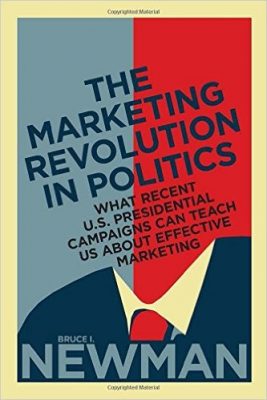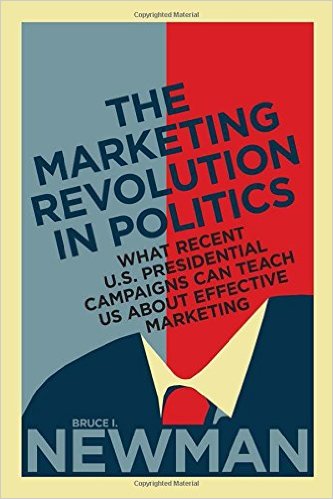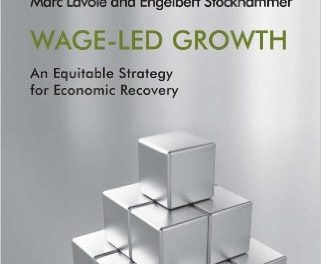 Author: Bruce I. Newman
Author: Bruce I. Newman
Publisher: University of Toronto Pres – Rotman-UTP Publishing – 205 pages
Book Review by: Sonu Chandiram
This book is about how to win an election with effective marketing, but the lessons presented in it by its author Bruce Newman can be used in any part of society where large numbers of people are involved, such as in business, non-profit organizations, and other sectors. It is about how Barack Obama won the 2008 United States presidential election, and how he used those same successful marketing techniques to get reelected in 2012. Why did he win? You will discover the answers in this book.
We’ve read another book recently on political marketing (named below) and among other points made in it, we discovered the following:
Very often, it is not the most experienced candidate who gets elected. In the 2016 presidential primaries, John Kasich spoke much about his long and broad experience as a senator and as governor of Ohio, and important work he got done reducing spending in national and state budgets, and creating jobs. While he was among three (along with Donald Trump and Ted Cruz) who lasted the longest in the Republican primary elections, he won only in his home state, then quit the race.
Results achieved in a given field are an important factor that influence people to think that maybe this candidate can be effective in government, so they may elect him on that basis. That’s one reason why Donald Trump has prevailed and beaten 16 other Republican candidates in the primaries. And lack of results or past failures in the foreign affairs arena by Hillary Clinton may be one reason why she is still struggling to win the Democratic nomination.
It’s not the candidate who raises the most money that wins. Former Florida Gov. Jeb Bush had that distinction but lost in the primaries. He was branded ‘low energy’ by Trump. That description just stuck, confirmed with his soft-spoken manner. It’s not harsh words against opponents either, that work. Marco Rubio called Trump a ‘con artist’ but that was counter-productive!
It’s not political philosophy that wins you an election. While Ted Cruz contrasted himself repeatedly as a ‘true conservative’ against Trump whom he said had liberal or non-Republican leanings, that didn’t seem to matter to voters. How about being ‘nice’? Ben Carson was viewed as a ‘nice’ person but Trump said being ‘nice’ cannot stop ISIS terrorists who are chopping off heads!
All the above points and more are discussed in a recently-published, highly-revealing, eye-opening book on political marketing entitled The Trump Presidential Playbook: A Wizard’s Path to the White House, by Geoff Blades.
Let us take a look inside The Marketing Revolution in Politics. Below is an overview of what you will find discussed in it:
Introduction
- The Evolution of Marketing in Politics
- Lesson 1: Follow the Marketing Concept
- Lesson 2: Use Technology Strategically
- Lesson 3: Integrate Research Methods
- Lesson 4: Develop A Unique Brand Identity
- Lesson 5: Create A Winning Advertising Strategy
- Lesson 6: Build a Relationship with Your customers
- Lesson 7: Be Prepared to Engage in Crisis Management
- Concluding Remarks
Bruce Newman writes that effective branding, advertising, and relationship-building are three very essential elements in a cutting-edge political campaign that results in a win. But what really makes a political, for-profit, or non-profit marketing campaign effective?
In each chapter, a ‘lesson’ is presented and discussed in detail, but the Introduction provides you the marketer some nuggets used by Obama’s team of campaign strategists:
- Data were used with great precision to target specific segments of voters – beyond their just being Democrats – and formulate advertising messages that would resonate with them
- Technology (e.g. social media sites) was used throughout the campaign to gather volunteers and contributions, described as “the most advanced use of micro-targeting techniques that had ever been witnessed in a political campaign.”
- Discovery from data that certain segments of the voting population in important states were more likely to vote for Obama. These were African Americans, Hispanics, single women and younger voters. Successful use of such data and effective marketing resulted in an Obama win. For example, cultural advertising on Spanish-language radio stations
Marketing in the political arena is not quite the same as marketing in the business world. Resonating with, and building support among voters and volunteers is more difficult than marketing to prospective customers and building a network of dealerships. In a presidential campaign, there are unique challenges, such as the following that Newman points out:
- The need to reach out to numerous and diverse groups of people
- Constantly-changing preferences of voters with new local and national issues
- Forces from within and outside the country that make it difficult to keep in control
- Presidential contests can and do get negative and even vicious, unlike business marketing
This is valuable book on marketing in politics, well worth a read.
Author:
Bruce I. Newman is a professor of marketing and a Wicklander Fellow in Business Ethics in the Kellstadt Graduate School of Business at DePaul University and founding editor-in-chief of the Journal of Political Marketing.







